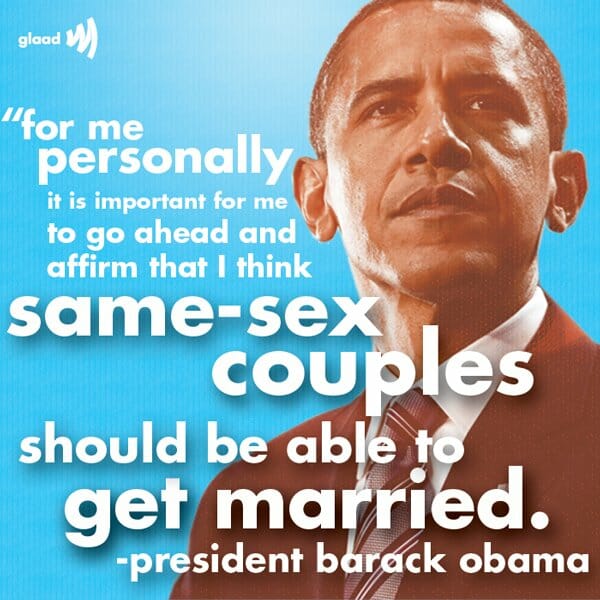In a historic move, on May 9, President Barack Obama announced his support for full marriage equality for gay and lesbian couples. In an interview with Good Morning America’s Robin Roberts, President Obama stated that his decision to publically support marriage equality is rooted in his faith. In the days immediately following President Barack Obama’s statement in support of marriage equality for gay and lesbian couples, news media outlets scrambled to address the president’s use of religious language in explaining how his “evolution” concluded with him choosing to support marriage equality. What we found was stark, but unsurprising.
Join GLAAD and take action for acceptance.
Trending
- Facts and Action for Banned Books Week
- Write It Out! Launches Annual Campaign to Uplift People Living with HIV Through Playwriting
- GLAAD Gaming Announces New Queer Emerging Developers Program
- We All Could Use Some Queer Joy! Be a Part of The Skin Deep + GLAAD’s New Collab
- Finding Yourself Begins With Celebrating Others’ Differences
- Must-See LGBTQ TV: October Premieres and Returns!
- Fact Sheet: Landmark Supreme Court Case Regarding Protections Against So-Called Conversion “Therapy” for Youth
- Lessons Learned: On Organizing for Inclusive and Welcoming School Systems

Skewed Perception: Religious Voices on President Obama and Marriage Equality
In a historic move, on May 9, President Barack Obama announced his support for full marriage equality for gay and lesbian couples. In an interview with Good Morning America’s Robin Roberts, President Obama stated that his decision to publically support marriage equality is rooted in his faith. In his historic announcement, he stated:
[In] the end the values that I care most deeply about and [Michelle] cares most deeply about is how we treat other people […] [We] are both practicing Christians and obviously this position may be considered to put us at odds with the views of others but, you know, when we think about our faith, the thing at root that we think about is, not only Christ sacrificing himself on our behalf, but it's also the Golden Rule, you know, treat others the way you would want to be treated. And I think that's what we try to impart to our kids and that's what motivates me as president and I figure the most consistent I can be in being true to those precepts, the better I'll be as a as a dad and a husband and, hopefully, the better I'll be as president.
In the days immediately following President Barack Obama’s statement in support of marriage equality for gay and lesbian couples, news media outlets scrambled to address the president’s use of religious language in explaining how his “evolution” concluded with him choosing to support marriage equality. Using our previous publication, ‘Missing Voices,’ as a guide, GLAAD looked at written and television coverage in the five days immediately following President Obama’s endorsement of marriage equality. What we found was stark, but unsurprising. This skewed perception of how marriage equality is perceived within faith communities, particularly minority people of faith, will almost certainly color the continuing conversation between now and the election in November.
FINDINGS
Overall, the religious spokespeople used in both written articles and television segments do not reflect the American people’s views on marriage equality.
Although white spokespeople are shown as being split evenly in terms of support for marriage equality, African American and Latino spokespeople are presented as being highly unsupportive, when they are, in fact, more supportive than the white population.Media outlets spoke overwhelmingly to straight male Christian clergy.
These voices came disproportionately from the Baptist tradition. (It is worth noting that the Obamas are not Baptist, but that the African American community is closely associated with the denomination.)
Very few voices came from women, members of the LGBT community, or non-Christian people of faith.
While all segments and articles spoke to African Americans and almost all spoke to white people, very few Latino voices were used, and other groups were absent entirely.
The top four anti-LGBT activists were quoted double the number of times that the top four pro-LGBT voices were quoted.
RECOMMENDATIONS
The media must find and make more consistent use of LGBT religious voices.
The LGBT movement needs consistent LGBT national religious spokespeople.
The media needs to highlight the growing number of LGBT-supportive African-American and Latino clergy.
More Publications
Share this
Join GLAAD and take action for acceptance.
ALERT Desk Incident Reporting
Our Picks
Topics
Don't Miss
This resource was created as a collaboration between GLAAD, The Trevor Project, and the Movement…

















